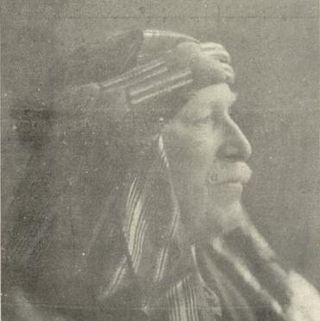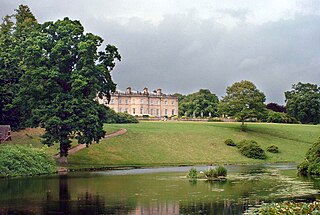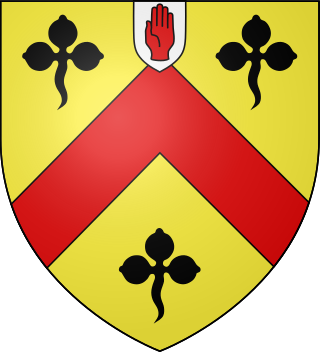Baron Denham, of Weston Underwood in the County of Buckingham, is a title in the Peerage of the United Kingdom. It was created in 1937 for Sir George Bowyer, 1st Baronet, a Conservative politician who had earlier represented Buckingham in the House of Commons. He had already been created a baronet, of Weston Underwood, in 1933. Bowyer was a great-great-great-grandson of Sir William Bowyer, 3rd Baronet, of Denham Court. As of 2017 the titles are held by his second but only surviving son, the 2nd Baron, who succeeded in 1948. In 1950 he also succeeded his distant relative in the Bowyer baronetcy, of Denham Court. Like his father, the 2nd Baron Denham was a Conservative politician and one of the ninety elected hereditary peers that remain in the House of Lords after the passing of the House of Lords Act 1999.

There have been three baronetcies created for members of the Bacon family, all in the Baronetage of England. As of 2008, one creation is extinct and two of the creations are extant. The extant titles have been merged since 1755.

Sir Edmund Antrobus, 3rd Baronet, was a British politician who sat as Member of Parliament for Surrey Eastern for six years as a Conservative, and Wilton for 22 years as a Whig/Liberal.

Lord Headley, Baron Allanson and Winn, of Aghadoe in the County of Kerry, was a title in the Peerage of Ireland. It was created in 1797 for Sir George Allanson-Winn, 1st Baronet, a former Baron of the Court of the Exchequer and Member of Parliament for Ripon. He had already been created a Baronet, of Little Warley in the County of Essex, in the Baronetage of Great Britain on 14 September 1776. His son, Charles Winn-Allanson, 2nd Baron Headley, represented Ripon, Malton and Ludgershall in Parliament. In 1833 he succeeded a distant relative as 8th Baronet, of Nostel. His nephew, the third Baron, sat in the House of Lords as an Irish representative peer from 1868 to 1877. His son, the fourth Baron, was an Irish Representative Peer from 1883 to 1913. His cousin, Rowland Allanson-Winn, 5th Baron Headley, was a prominent convert to Islam. On the death in 1994 of the latter's younger son, Charles Allanson-Winn, 7th Baron Headley, the titles became extinct.

There have been seven Baronetcies created for persons with the surname Lewis, two in the Baronetage of England and five in the Baronetage of the United Kingdom. Only one creation is extant as of 2010.

There have been two baronetcies created for persons with the surname Hanson, both in the Baronetage of the United Kingdom. One creation is extant as of 2010.

The Cradock-Hartopp Baronetcy, of Freathby in the County of Leicester and of Four Oaks Hall in the County of Warwick, was a title in the Baronetage of Great Britain. It was created on 12 May 1796 for Edmund Cradock-Hartopp, Member of Parliament for Leicestershire. Born Edmund Bunney, he was the husband of Anne Hurlock, granddaughter and heiress of Sir John Hartopp, 4th Baronet, of Freathby. On his marriage in 1777 he assumed the surname of Cradock-Hartopp in lieu of his patronymic according to the wills of his uncle Joseph Cradock and his wife's grandfather. His eldest surviving son Edmund, the second Baronet, died childless and was succeeded by his younger brother, William, the third Baronet. The title then descended from father to son until the death of his grandson, Charles, the fifth Baronet, in 1929.

There have been four baronetcies created for persons with the surname Sykes, two in the Baronetage of Great Britain and two in the Baronetage of the United Kingdom. Three of the creations are extant as of 2008.

There have been twenty one baronetcies created for persons with the surname Williams, eight in the Baronetage of England, three in the Baronetage of Great Britain and ten in the Baronetage of the United Kingdom. Only six of the creations are extant as of 2017.

Sir John Robert Mowbray, 1st Baronet PC, known as John Cornish until 1847, was a British Conservative politician and long-serving Member of Parliament, eventually serving as Father of the House.

There have been four baronetcies created for persons with the surname Miller, two in the Baronetage of England, one in the Baronetage of Great Britain and one in the Baronetage of the United Kingdom. Two of the creations are extant as of 2008.
There have been four baronetcies created for persons with the surname Child, two in the Baronetage of England and two in the Baronetage of the United Kingdom.

There have been eight baronetcies created for persons with the surname Wilson, one in the Baronetage of Ireland and six in the Baronetage of the United Kingdom.
There have been three baronetcies created for members of the Mosley family, one in the Baronetage of England and two in the Baronetage of Great Britain. Only one creation is extant. Since 1980, the title has been held jointly with Baron Ravensdale in the Peerage of the United Kingdom.
There have been six baronetcies created for persons with the surname Thomas, three in the Baronetage of England, one in the Baronetage of Great Britain and two in the Baronetage of the United Kingdom. Two of the creations are extant as of 2016.
The Mowbray Baronetcy, of Warennes Wood in the County of Berkshire, was a title in the Baronetage of the United Kingdom. It was created on 3 May 1880 for the Conservative politician John Mowbray. He served as Judge Advocate General from 1858 to 1859 and from 1866 to 1868 and was Father of the House of Commons from 1898 to 1899. Born John Cornish, he had assumed by Royal licence the surname of Mowbray in lieu of his patronymic in 1847. The second Baronet was also a Conservative politician.
Sir Edmund Buckley, 1st Baronet was a British landowner and Conservative politician who sat in the House of Commons from 1865 to 1878.
There have been three baronetcies created for persons with the surname Fortescue, one in the Baronetage of Nova Scotia and two in the Baronetage of England. Two of the creations are extinct while the other is dormant.
Edmund Buckley (1861-1919) was the second Baronet of Mawddwy, inheriting the title from his father Sir Edmund Buckley, 1st Baronet.

The Abdy baronetcy, of Felix Hall, in the County of Essex, was created in the Baronetage of England on 14 July 1641 for Thomas Abdy who was High Sheriff of Essex. The title became extinct in 1868.












